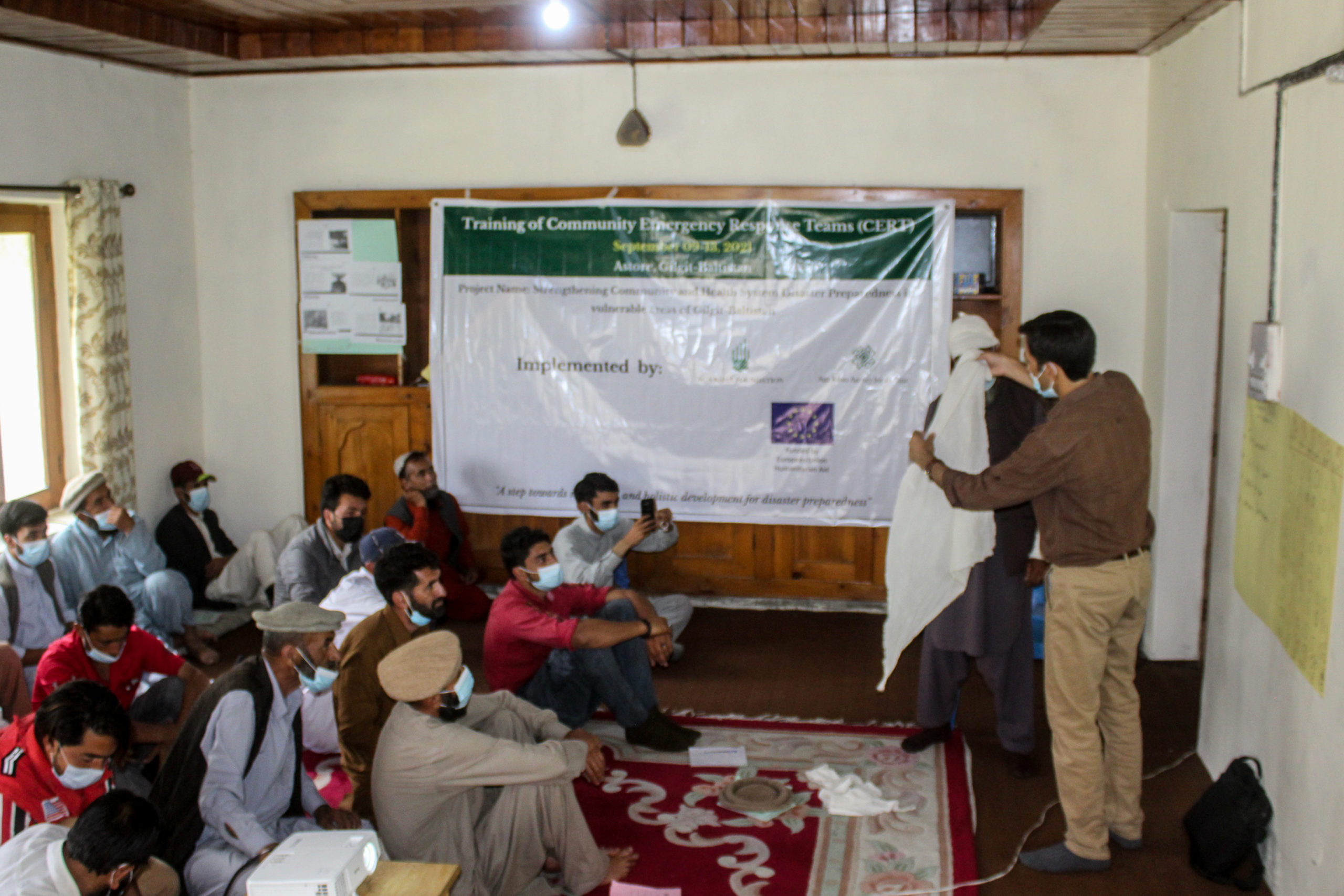A unique and majestic mountainous region in the north of Pakistan, Gilgit-Baltistan and its communities are highly vulnerable to natural disasters. Climate change disproportionately affects this region which is warming three times faster than the global average resulting in even more landslides and avalanches. The ability to respond to emergencies is further exacerbated by complex terrain and limited access to transport services. The pandemic highlighted these vulnerabilities as well as a lack of planning and awareness to support communities in the event of a disaster.
In response to these threats, the Aga Khan Foundation and the Aga Khan Agency for Habitat, with support from the European Union (EU), have completed the first phase of a new project to improve disaster and health preparedness at the community and institutional level in four highly disaster-prone areas of Gilgit-Baltistan: Diamer, Astore, Karmang and Shigar. Today, on International Day for Disaster Risk Reduction, we celebrate the spirit of teamwork and cooperation that has started to help reduce disaster risk in this region of Northern Pakistan.

The 18-month programme started in June 2021 and uses a community centric model for disaster management. The programme forms and trains community emergency response teams (CERT) who act as first responders during disasters and other emergencies. They are instrumental in reducing injuries, deaths, and damages in very remote villages that can take many hours to reach by external responders. The programme will directly benefit 74,000 people (48% female), including local communities, vulnerable groups, and health workers. It will also strengthen seven hospitals and enhance 30 target villages in emergency preparedness, response and management, provisioning medical first responder kits, and rehabilitating water and sanitation facilities.
Crucially, the project aims to ensure equal involvement and participation of women in disaster management activities. Ms. Farhat, a newly trained female CERT volunteer discussed the role of women in this programme: “The formation of a community emergency response team with 50% membership of women, in my village Bolan – an area prone to floods, avalanches and rock fall – is a new concept for both men and women. This initiative will not only equip women with knowledge and skills but will help to reduce sufferings. About 50% of those trained are women volunteers who will not only help to save lives but will be helping families with reserved minds and cultures on how to treat women.”

Nadia Maryam from Askoly village in Baltisan’s Shigar District, spoke of the confidence that women can take from participating in the programme: “Women are excelling in every field of life these days. Though the theme of disaster management and involvement of women is quite new for me and people in my area. But I truly believe that it is not a challenging field for women because the mountain women are strong, and this field of helping in emergencies needs strong people. I am saying this because CERT training has given us the confidence to step forward to help others, as well as enriching our knowledge.”
“I truly believe that it is not a challenging field for women because the mountain women are strong, and this field of helping in emergencies needs strong people.”
Nadia Maryam, Askoly village, Baltisan’s Shigar District
During training, Mr Shafa Ali from Finah village shared what becoming a CERT member meant to him: “Volunteering is my passion but this membership as a CERT volunteer has made me feel the real essence of volunteerism and what it means to help people in need. Our village Finah, in Astore, is a disaster-prone village and having floods is routine. The knowledge and skills I have now as a CERT member has enabled me to share the pain of disaster affected people, and to guide them to take immediate actions to reduce their sufferings if any disaster happen in the village.”

As well as CERT formation and trainings, the process of forming village disaster risk management committees will also continue. These will further develop village disaster risk management plans enabling communities to take pre-emptive measures to protect themselves and their assets, including stockpiles of emergency supplies in the most vulnerable and remote locations. As the programme continues, volunteers will begin putting their new training into action within communities and using their skills in live emergencies.
‘Strengthening community and health system disaster preparedness in vulnerable areas of Gilgit-Baltistan’ is an 18-month, €750,000 programme funded by the European Union and implemented by the Aga Khan Foundation and the Aga Khan Agency for Habitat. Views and opinions expressed are however those of the author(s) only and do not necessarily reflect those of the European Union. Neither the European Union nor the granting authority can be held responsible for them.
This article was written by Mehar Aftab, Ali Effendi, Maria Hayat Khan, Wajiha Masud, Julia Vera, Kendra Schreiner and Christopher Wilton-Steer.





